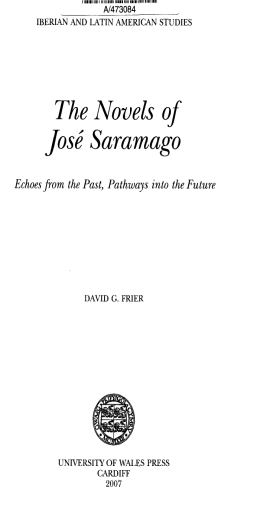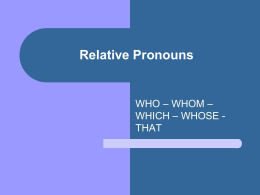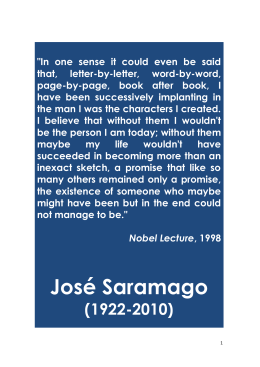Jose in All The Names1 and the theme of Responsibility Miriam Ringel* ABSTRACT: This article examines the theme of responsibility from variety perspectives in All the Names, by Jose Saramago (1997). The article argues that Jose, the protagonist of this novel, is passing a process that is typical to other male heroes in Saramago’s work: a man who is in a process of neglecting responsibility. Keywords: Jose Saramago. Responsibility. Existence. Alienation. The most wonderful thing given to man is free will and freedom Kierkegaard In this short article I shall try to illuminate, in a very general characterization, the beginning of a theme that requires much more attention in Saramago’s work2. This issue awakened my attention as a result of repeated sayings of the author himself, who argued that it is impossible to make an artificial separation between the author and the narrator. My argument to be followed is a result of close reading in Saramago’s work (fiction and non-diction), from which I conclude the author’s perception of the world concerning the theme of responsibility, as carried by his heroes. The word ‘responsibility’ (‘responsibilidad (e)’, ‘responsibilité’, ‘responsabilità), mainly in Latin languages unfolds also the word ‘response’, (‘resposta’, ‘réponse’, ‘risposta’), which means an answer, a reaction, a reply. In other words, it represents a kind of a dialogue with the other. Taking responsibility hence, is also the ability to converse with the fellowman, to listen and to consent, to act and react not only according to your personal comfort, but out of consideration and being conscious of the existence of the other beside you. The “lack” of family, especially the lack of children in the work of Saramago, is a subject that has been quite ignored. Indeed some families are mentioned in few novels, hence these are always ‘lacking’ families; Jesus, in O Evangelho segundo Jesus Cristo (1991) is not the biological son of Joseph, but the Son of God. Upon realizing it Joseph cannot find peace until his death. The squinter child in Ensaio sobre a Cegueira (1995) is there only to illuminate the image of the girl with the dark glasses who takes care of him when he cries as a result of his mother’s absence. In A Caverna (2000), Marta, the daughter who lives with her widowed father is pregnant. A hope of establishing a “normal” family is raised, but the book ends before the birth of the baby and leaves us with the feeling of “absence” until the end. In most of Saramago’s novels we meet women and solitary men, the majority in their fifties. They are attached to each other through a superficial relationship based on merely sex. Some fall in love, and all of them are in search of warmth that the other can give them. The act of establishing a family, the birth of children and the creation of continuity are not part of the personal project of most of the male characters. The majority are mainly busy in a reflective process, like H. in Manual de Pintura e Caligrafia (1977), Ricardo Reis in O Ano da Morte de Ricardo Reis (1984), or José in Todos os Nomes (1997). From my point of view the process of contemplation does not lead the heroes/men to experience the activities that require “responsibility”. IPOTESI, Juiz de Fora, v. 15, n. 1, p. 77-84, jan./jun. 2011 The basic problem/theme of the existentialism is the ontology of the ‘self ’, and it is a repeated problem in many texts of modern literature which deals with the progression of the self. For example: the reflective self, as it is described in Kafka’s texts. The hero of this kind of genre in literature is placed in a constant search of the ‘self ’ and therefore is in the ontology of deciphering. A tension is constituted between thought and existence. The problem arises at the moment when the hero starts to be in a state of a reflective activity, he then is disconnected from his initial state, as someone who reacts spontaneously. In this situation he does nothing but stay in the domain of reflection. If the person is disconnected entirely from the elements of spontaneous existence and assimilates into reflection, there is a huge fear he would stop reacting like a human being. (Something similar to the bug in Kafka’s Metamorphosis). José, the hero in Todos os Nomes, is a man in his fifties, a man who was never really in “touch” with life. And to be in touch with life and reveal responsibility means to get married. See Kierkegaard, Kafka and many other authors who never married in spite of their “will” and while not fulfilling this aspect in life, they withdraw the responsibility which is a huge part in sharing life with the ‘other’. It is only when José finds on his table the birth certificate of an unknown woman, and he began to look for this woman, that something really starts happening in his life. José is surprised at how he made such “a mistake”, for his collection contains only cards of famous people. It is only when he weaves an imaginative love story with this woman that this man becomes connected to life and reality. Until that moment (which comes very late in the plot of this novel), José spends his free time with a childish hobby, mentioned above: collecting cards of famous people, pieces of information he finds in the newspapers, etc. When the Registrar punishes him with a day of suspension because of his deeds against working traditions of the Central Registry, José realizes that it was just as: o chefe tem razão… vivesse eu duma maneira ajuizada normal, e certamente não me teria posto, com esta idade, a fazer colecções de actores, bailarinas… felizmente que não tenho descendentes, o mau de tudo isto, se calhar, vem de viver eu sem companhia, se tivesse uma mulher. Chegado a este ponto, o pensamento interrompeu-se... (TON, p. 80-81). José finds in the cards of his collection the absurd “real interest”, or “real importance” of his life. This “interest” leaves him closed, behind doors which do not allow him any real connection with ‘the other’. In a close reading of this novel we are acquainted with the hero who is occupied with imaginary dialogues, many are metaphysical ones: with the Ceiling, Decision, Wisdom and Discomfort, with the Rational thought and the Autonomy thought, with the Understandable and the Significance, etc. These imaginary dialogues fill the hours of leisure this man spends after long days of work, as a clerk, in the Central Regency where he has been working for more than 20 years. An office directed in a very strict way and in a hierarchy described so ironically through the whole novel. The attitude towards marriage – Existence and Alienation ‘Through marriage man is being ‘acquitted’ his existence or stays in his alienation’, (Kierkegaard, in SAGI, 1991, p. 34), and Kafka also wrote in his diaries about marriage as the wonderful point of gravity of life and of existence. (He held the idea of marriage to be beautiful, but he doubted that any instance of it was very good). (KAFKA , entry from his diary 17th of October 1921). The test of existence is, hence, according to this perception, to be married. Marriage is one of the possibilities of realizing the affinity to the concrete existence. Marriage expresses the harmonic existence IPOTESI, Juiz de Fora, v. 15, n. 1, p. 77-84, jan./jun. 2011 78 of the human being with itself, an existence with significance, existence which is a test to the most concrete experience of life. We are aware that both Kierkegaard and Kafka never marry. Both brook off twice a long-term engagement exactly when they were one step from realizing marriage. The reason is attached to the inability to overcome the alienation experience, the inability to create true relations between the ‘self ’ and existence. Kierkegaard thought that marriage and domestic responsibility were incompatible with philosophical tasks he thought he had to fulfill. And Kafka wrote in Letter to Father: “Marrying, founding a family, accepting all the children that come, supporting them in this insecure world and perhaps even guiding them a little, is, I am convinced, the utmost a human being can succeed in doing at all”, (KAFKA , 1975, p. 46) and as mentioned before, Kafka did not succeed in fulfilling this comprehension in his private life. José in Todos os Nomes is a man who succeeded “escaping” marriage and its demands of responsibility. In a close reading of Saramago’s work I come to the conclusion that most of his male heroes are people who never got married and are not ready to face responsibility upon life3. H. in Manual de Pintura e Caligrafia, Raimundo Silva in História do Cerco de Lisboa (1989), Ricardo Reis in O Ano da Morte de Ricardo Reis live their lives near reality. Tertuliano Máximo Afonso in O Homem Duplicado (2002) tries to avoid Maria da Paz and any real commitment to her. Even Baltasar in Memorial do Convento (1982) belongs to this ‘bachelor’s group’. He never really married Blimunda and the latter is the person to take the real responsibility for their existence and her contribution for the success of Bartolommeo Lourenço’s flying machine has a tremendous significance. Exceptions are the doctor and the first blind person in Ensaio sobre a Cegueira, but also these two men do not take responsibility and it is the woman who really leads the group, the woman who takes the responsibility to preserve the existence of the blinds, and in long term evidence it is the woman who is responsible for the general existence of humanity. While Kierkegaard and Kafka, Fernando Pessoa and many other male figures, in the history of literature and philosophy, are engaged to be married at a certain stage of their lives and in this act they seem to prepare themselves for the “real act” of marriage, José, the hero of Todos os Nomes, never had a relationship with a woman, nor simple friendship, not even any kind of a close connection throughout his entire life. The sense of alienation, described in the above mentioned authors is a sense of infinity and infinity means – fantasy. If this is the picture we draw, alienation and freedom become synonymous to the very same situation, or two sides of the same coin. ‘The man dancing upon the abysm’, this is how Kafka describes the sense of existentialism in a very poetic description, in his short story “The Bridge” (KAFKA , 1971, p. 90). A kind of a fidget dances of the artist whose body becomes a human bridge and who fell into abysm while human beings step on his body-bridge. To become a bug in Metamorphosis is also a disposition which allows moving freely on the walls and ceilings, but it is also a way to describe the most profound feeling of alienation ever described in a literary text. José is a man who lives completely in a state of fantasy, collecting cards of anonymous persons; performs imaginary dialogues through the whole plot. The permanent stay in fantasy is a kind of selfalienation, but it allows also, as already mentioned, a kind of freedom which does not exist within a man without imagination. The freedom José “takes” to be absent from work is in order to look for the unknown woman. He allows himself to spend a night in the school where this woman studied in her childhood and a night in the cemetery. This sense of freedom which this man feels is a result of the simple fact that no one will IPOTESI, Juiz de Fora, v. 15, n. 1, p. 77-84, jan./jun. 2011 79 “look for him”, because he does not have any real relationships. But this is also freedom which can be characterized as a melancholy alienation and not freedom in which a happy existence is being realized. Freedom is “the possible being”, the potential, not the concrete historical mode where freedom reveals. In imagination one can find the possibility of unlimited freedom. Freedom, hence, is a position a person adopts. This way the feeling of guilt of the existentialist, (and I see José, in Todos os Nomes an existentialist hero), is a result of the basic idea of freedom in which one cannot say: ‘it happened to me… someone did it to me…’ in any situation it is Choice and therefore there is Guilt. Guilt is a kind of balance between choice of a certain kind and preservation of other possibilities. Guilt is connected to the act of choosing, therefore, guilt and responsibility are attached to each other. In this manner, José who feels a great sense of guilt for not fulfilling all his duties “dares” to be absent from work or to come in a few minutes later than the hour he should be at the Central Registry. (In the strict rules of this office, these issues are considered to be disorderly conduct with no forgiveness). An unexplained sensation of guilt is in “the late exit” from his “shell”, looking for the unknown woman. If he would find her a few days earlier, is it possible that she would not choose the solution of suicide? Is the love he felt for her, though developing in his imagination, (but that could have been realized), would have helped her to face life differently? Nevertheless, José is a helpless hero and this helpless is something which is difficult to overcome in reality of settled life, organized and ruled by ‘others’ (by the Regency, by the director, by bureaucracy). […] era como se tivesse estado a ponto de embarcar à descoberta da ilha misteriosa, e no último instante, já com o pé na prancha, lhe aparecesse alguém de mapa estendido, Não vale a pena partires, a ilha desconhecida que querias encontrar já está aqui, repara, tanto de latitude, tanto de longitude, tem portos e cidades, montanhas e rios, todos com os seus nomes e histórias, o melhor é que te resignes a ser quem és (TON, p. 48, emphasis is mine). Where is this unknown island4 of José? Does he really need to set off to discover it or is the unknown island already here? And the “here” in this case is to “resign yourself to being who you are” (“te resignes a ser quem és”). In Either/or Kierkegaard wrote: ‘It is true that doors of good luck are not opened inward, that it will be possible to open them by force; they are opened outward and therefore there is nothing we can do about it’. (KIERKEGAARD, 1996, p.45). This statement can be understood in a variety ways: The doors of good luck are not opened inward – the possibility to observe inward is limited; it is impossible to open these doors of good luck (because they are not opened inward) with force; there is no way to fight the doors of good luck and since they are opened outward there is nothing we can do, but to accept it as it is. Stepping out through the real doors of his home and entering through other doors, (Metaphors or real); José is able to glance from the outward into the inward. Between José’s apartment and the Central Registry there was a door that opened into the office but was kept permanently closed. José was told to lock it and that he could never go through it at any time. Through this ‘secret’ door José enters at night to the labyrinth of the archives of the Central Registry, especially to the archives of the dead from which he goes out, paradoxically, to real life. Sitting in his room, closed between four walls and not choosing to open doors, the utmost of his acts is to contemplate and reflect without any solution. Not only that there is no possibility of any kind of relation with the ‘other’, it is also a state in which there is not any possibility to have any contact with yourself, with your being. IPOTESI, Juiz de Fora, v. 15, n. 1, p. 77-84, jan./jun. 2011 80 The search for the ‘other’ – as a way of taking responsibility upon existence descobrir o outro é descobrir-se a si mesmo Saramago The discussion upon ‘the other’ in its variety of interpretations is a long and complicated discussion in Western philosophy. Many of them consider responsibility as being responsible for the other. This means that the responsibility is not for what is mine or even being afflicted to me. Sartre (Sartre 1988, p.14-15) talks about our freedom through which we are always responsible for our personality and deeds. But, in fact, we are responsible for much more than that. We are responsible not only for what we will do or be, but also for what others will do. Our responsibility is much more important than we imagine ourselves to be, as in any act of choosing I am a representative of all humanity. If I act in a selfish way, by that I am choosing the image of mankind as a selfish creature. Being connected and being an integral part of other’s lives, while each of my acts influence and design the image of the society in which I act; I am creating and establishing the values for all mankind. Since we chose our lives and it is our responsibility, there are many who are in a constant state of fear and nausea. For most of us it is difficult and we do everything to avoid and ignore such an enormous responsibility. In contradiction to the non-authentic types, who live in a constant self-falsehood and in chronic fear, Sartre’s purpose is to bring human beings to an authentic experience, a situation in which they will confess that a human being is free and that in any circumstances they cannot be but in desire to absorb this freedom and the freedom for others. José, the hero in Todos os Nomes, is a man who lives in a non-authentic life. This man lives in constant fear from the authorities and does not make the free natural choice given to him, as a human being. It is only when he goes out in search of the traces of the unknown woman, a search for ‘the other’, that he succeed penetrating into his authentic existence in which one can find the freedom to chose an inclination to the otherness. Each human being gives his answer for the relations he/she has with other people through his/her life. Will José response to the demand directed to him from the other, or will he sink into the comfort of a narcissistic existence? Will he go out to look for the unknown woman and maybe will save her life? Or will he sink into his world of fantasy and deeply close into himself and into that inability which characterized his fifty years of life? The lady of the ground-floor apartment in the house he arrived in his search for the unknown woman is suspicious that he presents a false document and she cannot understand why he did not use the phone book as a simple way to find people. This lady is the only person with whom he has along the novel real interaction, real dialogues. When he is out of her home the thought ‘runs’ independently and a ‘dialogue’ between the irrational thought and the autonomous thought is taking place: […] e seguramente na cabeça de toda a gente, um pensamento autónomo que pensa por sua própria conta, que decide sem a partipação do outro pensamento, aquele que conhecemos desde que nos conhecemos e que tratamos por tu aquele que se deixa guiar por nós para nos levar aonde cremos que conscientemente queremos ir, mas que, afinal de contas, poderá ser esteja a ser conduzido por outro caminho... mas sabemos nós, enfim, que o que dá o verdadeiro sentido ao encontro é a busca e que é preciso andar muito para alcançar o que está perto (TON, p. 69, emphasis is mine). IPOTESI, Juiz de Fora, v. 15, n. 1, p. 77-84, jan./jun. 2011 81 José continues his interior dialogue: what does he know about himself? In fact, nothing, only that he is a sad man. Does he really want to meet the unknown woman? To meet that woman in real life means to meet your ‘self’ with yourself, yourself with a reality which requires an attitude of responsibility to existence. The continuation of the search for the unknown woman brings him into a dialogue with the “question” that lies down next to him and says: “É absurdo, mas já era tempo de fazer algo absurdo na vida” (TON, p. 83). The absurd of life is not by doing the fearless deeds he will perform later that day (entering the school). The absurdity is in his everyday life in the Registry. The “chefe” who asks the clerk directly how he feels, and skips the usual hierarchy, is really something new in the office and other clerks are deeply surprised. A metaphysical dialogue with the ceiling helps José: O imaginário e metafísico diálogo com o tecto servira-Ihe para encobrir a total desorientação do seu espírito, a sensação de pânico que Ihe vinha da ideia de que já não teria mais nada para fazer na vida, se, como havia razões para recear, a busca da mulher desconhecida havia terminado... e chorou sem vergonha, ao menos desta vez não havia ninguém ali para se rir dele. Este é um daqueles casos em que os tectos nada podem fazer para ajudar as pessoas aflitas, têm de limitarse a esperar lá em cima que a tormenta passe... (TON, p. 159). Coming back from the cemetery he looks at the ceiling hoping for it to help him. But the ceiling does not “want” to cooperate with him. At this stage imaginary dialogue can be no help. He needs to look inside himself and arrive at a conclusion of what he should do from now on. With the discovery that the unknown woman is dead José thinks that the search came to its end. To the question of the woman from the ground floor if he would go back to his hobby of collecting cards of famous people, his answer is negative. [...] à Conservatória só interessa saber quando nascemos, quando morremos, e pouco mais... à Conservatória é indiferente se, no meio de tudo isso, fomos felizes ou infelizes, A felicidade e a infelicidade são como as pessoas famosas, tanto vêm como vão, o pior que tem a Conservatória Geral é não querer saber quem somos, para ela não passamos de um papel com uns quantos nomes e umas quantas datas... (TON, p. 197). The first real dialogue he made in his life is documented in his diary. An intimate dialogue, something he is not used to. If you had found the unknown woman: “que se pretendesse saber quem ela realmente era teria de começar a procurá-la outra vez e que a partir daí poderia ser muito mais difícil...”(TON, p. 198), as in a real life a meeting between a man and a woman is not so easy. In the imagination things may look easy and clear but in reality you have to face the actual encounter. José never experienced such an encounter and maybe will never take the “responsibility” of a real relationship with a real woman. Deciding to do a reversed search, from Death into Life, José spends a night in the apartment of the unknown woman (a key was given to him by her mother), and this last scene is the most touching in the book. What a simple clerk of the Registry can do is only bring her Name back into life, nothing else. […] pensa que se abrir o guarda-fato não resistirá ao desejo de correr os dedos pelos vestidos dependurados, assim, como se estivesse a afagar as teclas de um piano mudo…não será por lê-lo que os vestidos dela deixarão de estar vazios...o que acabou, acabou... depois abriu o guarda-fato, ali estavam os vestidos da mulher... Inclinou-se para eles até tocar com a cara, ao cheiro que desprendiam poderia chamar-se cheiro de ausência...(TON, p. 272 – 273, emphasis is mine). IPOTESI, Juiz de Fora, v. 15, n. 1, p. 77-84, jan./jun. 2011 82 Saramago testifies in the dialogues with Carlos Reis (Reis, 1998, p. 135) that José, the protagonist of Todos os Nomes, is in his personality the closest to the author. José who became aware of himself and of his feelings through the search for the unknown woman, in other words, for the other, does not really take any kind of responsibility. After he left the cemetery and after he visited the woman’s “grave”, or what was supposed to be her grave (since the shepherd changed the numbers on the stones so one can never know who is really buried there), he will go back to his everyday life. It is for us, the readers, to wonder: will he change his ascetic way of life? Will he look for a real woman to host him in his loneliness? A close reading of Saramago’s diaries will reveal the attitude of this author in relation to the way this book was received by the readers. And this is what Saramago wrote in his 5th diary: Ponto final em Todos os Nomes. Não sou capaz de imaginar o que se dirá deste livro, inesperado, creio, para os leitores, de certo modo ainda mais que o Ensaio sobre a Cegueira. Ou talvez sim, talvez imagine: dirão que é outra história triste, pessimista, que não há nenhuma esperança neste romance. No que a mim respeita, vejo as coisas com bastante clareza: acho, simplesmente, que quando escrevi O Evangelho segundo Jesus Cristo era novo de mais poder escrever o Ensaio sobre a Cegueira, e, quando terminei o Ensaio, ainda tinha que comer muito pão e muito sal para me atrever com todos os nomes... À noite, tive uma ideia que explicará melhor o que quero dizer: foi como se, até ao Evangelho, eu tivesse andado a descrever uma estátua, e a partir dele tivesse passado para o interior da pedra. Pilar acha que é o meu melhor romance, e ela sempre tem razão (SARAMAGO, 1997, p. 122). The end of this novel does not leave us with an answer whether or not the search for the unknown woman will lead José into real life. Will he take from now on the “responsibility” of looking for a real woman, making a real commitment? We do not know, but still there is hope. José em Todos os Nomes e o tema da responsabilidade RESUMO: Este artigo aborda o tema da responsabilidade a partir de perspectivas diversas em Todos os Nomes de José Saramago (1997). O artigo argumenta que José, o protagonista deste romance, está a passar por um processo que é típico para outros heróis masculinos na obra de Saramago: um homem que está em um processo de negligenciar a responsabilidade. Palavras-chave: José Saramago. Responsabilidade. Existência. Alienação. Notas explicativas * Ex- inspectora de Estudos Literários em Ort, numa organização dos colégios e escolas secundárias. Em processo de acabar a tese de doutoramento em Bar-Ilan Universidade, Ramat-Gan, Israel, Programa da Hermenêutica. Orientador: Prof. doutor Sagi Avi. 1 In quoting I used the Portuguese copy: SARAMAGO, José. Todos os Nomes. Lisboa: Caminho, 1997. 279 p. From now on the citations from this book will appear with abbreviation TON. 2 Upon the theme of responsibility, now being developed in my dissertation upon Saramago, I referred in my IPOTESI, Juiz de Fora, v. 15, n. 1, p. 77-84, jan./jun. 2011 83 book: RINGEL, Miriam. Viagem na Senda das Vozes - a Vida e a Obra de José Saramago. Jerusalem: Carmel, 2009. Chapter III, p. 167-194. “O herói saramaguiano e a responsibilidade – Todos os Nomes; Memorial do Convento; História do Cerco de Lisboa”. 3 On May 2009 in a private dialogue with Saramago at his home in Lisbon, I presented him this idea. Saramago found it very interesting and said he had never thought about it before. We then “moved” through all his novels and found together that all his male heroes are in fact not ready to face responsibility and quite all of them stayed bachelors at their fifteenth. Moreover Saramago wondered why he created his male heroes in this way: “In my life, I was never alone”, he said to me “I had three long term relationships with women (Ilda Reis, Isabel da Nóbrega e Pilar del Rio). I think I felt pity for these men…maybe this is the reason I described them like that”. 4 SARAMAGO, José. O conto da Ilha Desconhecida. Lisboa: Caminho, 1997. Saramago uses his own work to make auto intertextuality. Referências KAFKA , Franz. Description of a Struggle, translated into Hebrew by Sandbank Shimon. Tel-Aviv: Schocken, 1971. 259 p. ______. Letter to Father- Letters to Milena, translated into Hebrew by Korenfeld Edna. TelAviv: Schocken, 1975. 316 p. ______. Diaries, 1914-1923, translated into Hebrew by Isaac Haim. Tel –Aviv: Schocken, 1979. 290 p. KIERKEGAARD, Soren. Either/Or, translated into Hebrew by Miriam Eitan. Jerusalem: Magnes, Hebrew University, 1996. 384 p. SAGI, Avi. Kierkegaard: Religion, and Existence - The Voyage of the Self. Jerusalem: Bialik Institute, 1991. 280 p. SARAMAGO, José. Cadernos de Lanzarote, Diário –V. Lisboa: Caminho, 1997. 228 p. ______. Todos os Nomes. Lisboa: Caminho, 1997. 279 p. ______. O conto da Ilha Desconhecida. Lisboa: Caminho, 1997. 45 p. SARTRE, Jean. Paul. L’Existentialisme est un humanisme, translated into Hebrew by Golomb Jacob. Jerusalem: Carmel, 1988. 72 p. REIS, Carlos. Diálogos com José Saramago. Lisboa: Caminho, 1998. 173 p. RINGEL, Miriam. Viagem na Senda das Vozes, A Vida e a Obra de José Saramago. Jerusalém: Ed. Carmel, 2009 (em hebraico). 251 p. IPOTESI, Juiz de Fora, v. 15, n. 1, p. 77-84, jan./jun. 2011 84
Download











